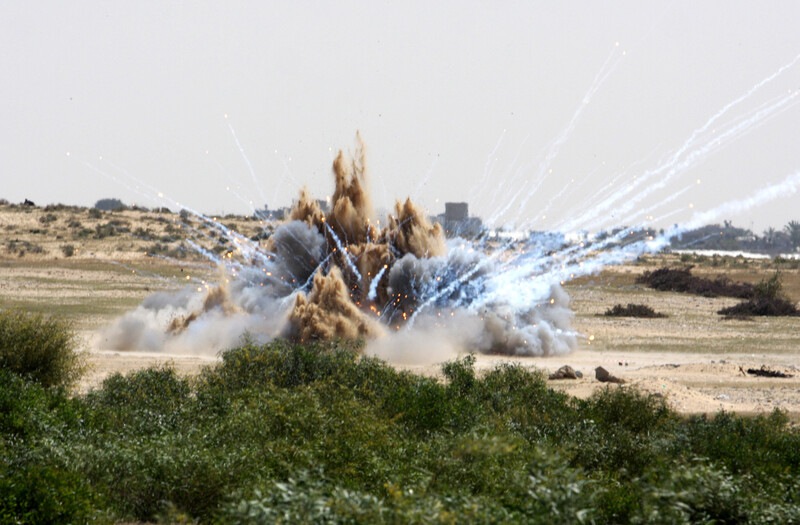Rights and Accountability 25 January 2019

Elbit has made white phosphorus munitions, used by Israel during its attacks on Gaza.
APA imagesThe weapons industry has given a new twist to the cliché that patriotism is the last refuge of the scoundrel.
For the past few months, the firm OIP Sensor Systems has been promoting its bid for a major contract to provide the navies of Belgium and the Netherlands with mine warfare vessels. The charm offensive in which OIP has been engaged stresses its local connections by using the slogan “buy Belgian.”
The slogan is duplicitous. Although OIP has a plant near the Belgian city of Ghent, the firm is wholly owned by Elbit, a leading Israeli arms maker.To all intents and purposes, then, OIP is an Israeli company. Its parent firm Elbit has supplied white phosphorus munitions and drones that have been used during Israeli attacks on Gaza.
Elbit also manufactures cluster weapons for the Israeli army, helping it circumvent an international ban.
Earlier this month, Elbit was awarded a $333 million contract to supply the Israeli military with ammunition. In total, sales to the Israeli military account for about one-fifth of Elbit’s revenue.
OIP’s charm offensive has been somewhat contradictory.
A separate tweet by the company confirms that the wares being touted to Belgium are “based on” equipment already deployed by Elbit:
And the vessels which OIP is offering would include the Elbit-manufactured Seagull system.“Buy Israeli” would be a more honest – if less astute – slogan for OIP’s campaign.
Asked for comment, the Belgian defense ministry would only say that “the acquisition procedure is still ongoing” and that the bids are “all being evaluated.”
The Belgian government does not appear to have qualms about spending on Israeli weapons.
In 2015, Elbit won a $150 million deal to arm infantry soldiers in Belgium, the Netherlands and Luxembourg.
Repulsive
Belgium is taking the lead in the mine warfare activities that have attracted OIP’s attention.
They are part of a weapons modernization drive, with an overall budget exceeding $10 billion.
The proposed expenditure would be immoral under any circumstances. That $10 billion is being allocated to the military at a time of worsening hardship in Belgium – particularly its largest city – makes the whole program repulsive.
Brussels has witnessed an increase of almost 100 percent in the numbers of homeless people living on the streets over the past decade. If Belgium can splurge $10 billion on weapons, there is no reason why it can’t find shelter for everyone in need.
OIP has long been coy about its precise relationship with Israel. Freddy Versluys, the firm’s CEO, has denied in the past that Israel was one of his clients.
His denials ran contrary to details included in official Belgian reporting, which strongly indicated that OIP was making components for export to Israel.
Versluys is a leading figure in the Belgian weapons lobby.
Belgium is presenting its mine warfare activities as a contribution to wider European Union efforts towards strengthening military capabilities.
Angela Merkel, the German chancellor, recently argued that such efforts should lead to the formation of a European army. Donald Trump’s belligerence and Britain’s forthcoming departure from the EU may accelerate this work.
More than likely, Israel’s weapons dealers are keeping a close eye on what the EU is doing. They can angle for the contracts that will inevitably be on offer.
With a little subterfuge, arms tested out on Palestinians can be presented as desirable commodities.





